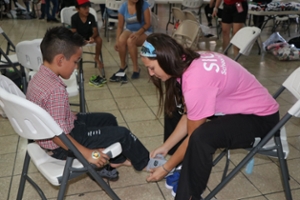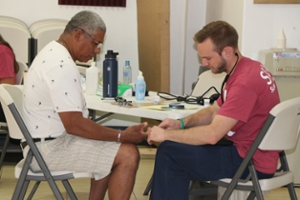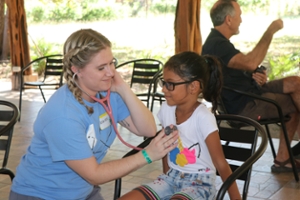 Southern Illinois University Edwardsville’s commitment to service was on display for the third consecutive year as the School of Nursing (SON) took a 12-person team comprised of students and faculty to Costa Rica Jan. 4-11, where they saw approximately 850 patients in four days at different locations.
Southern Illinois University Edwardsville’s commitment to service was on display for the third consecutive year as the School of Nursing (SON) took a 12-person team comprised of students and faculty to Costa Rica Jan. 4-11, where they saw approximately 850 patients in four days at different locations.
Valerie Griffin, DNP, SON assistant clinical professor and director of Nurse Practitioner Specializations, and Sheri Compton-McBride, SON instructor and director of clinical acquisitions in the Department of Primary Care and Health Systems Nursing, led the team that traveled in partnership with Central America Mission Projects (C.A.M.P.). In seven days, they visited La Carpio, Alajuela, Coco and Casa Vida.
“Every student has a different goal going in,” Griffin said. “Every student is transformed in ways they could not even imagine. We all enter these experiences thinking we are going to provide a service to the underserved. What we all quickly realize is that we personally have been served in meaningful ways we never expected.”
Ten graduate students included nine family nurse practitioner students and one nurse educator student. Four of the doctoral students, Gabrielle Giamonco, Wendy Rogers, Ashlee Schoby and Tyler Tanzyus shared their thoughts and experiences.
Decatur native Tanzyus said, “For seven days, this group touched lives of and provided medical care to the underserved. We placed 2,000 pairs of shoes on children’s feet.”
Tanzyus said arriving in Costa Rica was an absolute culture shock. “I had no expectations in mind, but was soon in awe of the condition in which I found these families,” he said. “For some, this would be the only hot meal they received all week. The first lesson quickly learned was to stop taking things for granted, such as a warm meal. These families struggle day-in, day-out not knowing how or when they are going to get their next meal.”
 Tanzyus described his encounter with a little boy who talked to him in Spanish. “I asked one of the translators, as I couldn’t understand what he was trying to ask,” he said. “The translator looked at me with a smile, ‘He is asking when you will be back.’ My eyes filled with tears as I tried to hold back my emotion.
Tanzyus described his encounter with a little boy who talked to him in Spanish. “I asked one of the translators, as I couldn’t understand what he was trying to ask,” he said. “The translator looked at me with a smile, ‘He is asking when you will be back.’ My eyes filled with tears as I tried to hold back my emotion.
“Which brings me to lesson No. 2: find joy in the simple things in life, the connections you make, the people you encounter and the memories that can be shared. As the week came to an end, I was not able to completely grasp the transformation I just went through. Positively influencing the lives of the underserved has truly changed my attitude and perspective on life. It has given me meaning and helped refocus my energy.”
Schoby, of Athens, said putting shoes on the children’s feet was a beautiful experience. “Each child also got a new clean pair of socks to wear with their shoes,” she said. “I can’t put into words the feelings I had while doing this. The pure joy of getting new shoes. Some of the children even gave me a hug after I put on their shoes for them.”
Schoby expected the trip would be special and change her. “But I am changed in ways I did not expect,” she said. “Heading home was such a bittersweet experience. I was sad to be leaving this beautiful place and the people there, who I knew needed more healthcare. On the way to the airport, I truly felt that it won’t be goodbye forever. I will be back in Costa Rica in the future!”
Rodgers, of Lincoln, remarked how the Costa Ricans were so patient, relaxed and kind. “They waited patiently for their turn and gently explained their symptoms or concerns,” she said. “Even with the language barrier, they never became negative or agitated.
 “One of the real-life lessons I want to remember is patience and kindness, because nothing is so stressful that anyone deserves anything less. If people with nearly nothing can find happiness and treat people with kindness all the time, so can I. As I move forward in life, I will seek opportunity to help others whenever I can. I will pay it forward by performing simple or small random acts of kindness. Everyone can benefit from kindness and humility.”
“One of the real-life lessons I want to remember is patience and kindness, because nothing is so stressful that anyone deserves anything less. If people with nearly nothing can find happiness and treat people with kindness all the time, so can I. As I move forward in life, I will seek opportunity to help others whenever I can. I will pay it forward by performing simple or small random acts of kindness. Everyone can benefit from kindness and humility.”
Chancellor Randy Pembrook introduced the C.A.M.P. concept to the SIUE campus upon his arrival in 2016 and has made the excursion three of the past four years, preceded by 11 consecutive annual trips prior to his SIUE tenure.
Pembrook split his time working with a construction crew, and helping with nursing and dental equipment set up and tear down. Meanwhile, Mary Jo Pembrook, his wife, worked with the nurses during the week, checking-in people and securing initial patient information.
“The construction project included building an outdoor meeting area with a restroom, kitchen and gathering space as an extension to an apartment facility,” Pembrook said. “The apartment facility is called Casa Luz and is used by pregnant young girls who have been trapped in the sex trafficking industry. The complex gives them a safe place to receive treatment, care for their children and learn skills to re-enter society.”
“It is a transformational experience for me and the students,” Pembrook said. “I also call it a ‘calibrating experience.’ Seeing people who have practically nothing and are dealing with almost inconceivable challenges puts a lot of things in perspective. There is something quite special that happens when giving of oneself ends up returning more than what is expended.”
Giamanco, of St. Louis, related a quote from the Japanese Village of Fudai’s late mayor Kotaka Wamura: “A person’s most useful asset is not a head full of knowledge, but a heart full of love, an ear ready to listen and a hand willing to help others.” Giamanco said, “I believe each and every one of the SIUE team accomplished that quote.”
In March, the SON will return with six undergraduate nursing students and nine alumni. Three of the alumni joined the Costa Rica trip in 2018, while six went in 2019.
Photo: (Top Right) - Gabrielle Giamonco with shoes.
(Middle) - Tyler Tanzyus testing a patient’s glucose.
(Lower Right) - Ashlee Schoby with her stethoscope and a young patient.